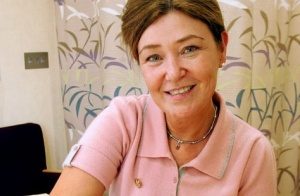Role: Friends of Cancer Centre complementary therapist
Company: Belfast Health & Social Care Trust
Track Record: I work in the inpatient wards at the Cancer Centre, Belfast City Hospital in a post funded by the Friends of the Cancer Centre, a leading local cancer charity. Working in partnership with the Belfast Health & Social Care Trust, the charity provides suppor
What is complementary therapy and how does it differ to alternative medicine?
Complementary medicine is used alongside conventional medicine, whereas alternative medicine is used in place of conventional medicine. Complementary therapy is the name given to a number of fully tried and tested therapies which can be used to support people. In the past they existed largely outside the institutions where conventional or orthodox care was taught and provided, however currently there is an integrated approach. There are different kinds of complementary therapies available but the best known and most commonly used ones are aromatherapy, massage, reflexology, yoga, meditation and visualisation. Complementary therapy aims to complement or supplement conventional therapies or treatments and aims to improve a person’s well-being.
What does your job entail?
Spending time in hospital can be somewhat bewildering; patients meet lots of different professionals and have to cope with machinery and techniques used in the treatment of cancer. They can feel very anxious and they may have physical symptoms such as pain, insomnia, fatigue and nausea. My job is to support patients and families through complementary therapies. I work within a multi-disciplinary team and my role is to provide care to inpatients through aromatherapy, massage and reflexology.
Did you always work in this sector?
When I left school at 17 I started work for a leading insurance company in Belfast and was there for 23 years, handling a variety of roles but always customer facing. I eventually worked my way up to managing a team of 24 people and co-managing a multi-million pound, 24/7, 365 days a year accident management contract for a corporate customer. I moved from there to a customer care post in an e-business and internet solutions company. I worked for that company for 18 months. I was sent on a management course and the facilitator asked everyone attending a question that made me think about my future.
I was asked to sit on my own for a while and write down anything that came to mind. I sat in front of a blank piece of paper for quite a while before writing down one word, ‘Aromatherapy’. I had personally benefited from various complementary therapies for over twenty years, but until that moment I had never considered that I could be a therapist myself. Almost immediately I found a course and retrained for my new career and I have never looked back.
How did you build your career after re-training?
When my initial training in complementary therapy was complete, I worked in a nursing home in Belfast with elderly patients diagnosed with Alzheimer’s disease. I was also employed by Belfast Metropolitan College as a part-time lecturer in complementary therapy for a number of years, teaching full time students at the campus in Tower Street. I have also been involved in community teaching with various groups around the city. I had experience of working with patients with a cancer diagnosis through Action Cancer’s service before applying for the Friends of the Cancer Centre post within the Belfast Trust.
Tell us about you qualifications and training.
Training has taken place over a number of years and, in essence, is still ongoing in terms of continual professional development. My initial training took place at Belfast Metropolitan College. I have diplomas in Anatomy and Physiology, Clinical Aromatherapy, Advanced Massage, Indian Head Massage, Reflexology and Crystal Therapy amongst others.
The level of training required to work with patients with cancer needs to be extensive.
I am a member of the Association of Reflexologists, (AOR) International Federation of Professional Aromatherapists (IFPA), European College of Bowen Studies (ECBS) and the Irish Institute of Reflexologists (IRI).
What qualities are required for your position?
I am able to build relationships with people very quickly. I have the ability to put people at ease and gain their trust because I am open, honest, and have a good personality. I genuinely care about people and am able to create a safe space for them where they feel cared for.
What is the most rewarding or exciting aspect of what you do?
Every day is different, so my job could never be described as boring. I am challenged all the time. I feel rewarded because I get the chance to work closely with a dedicated team of people within a specialist service who support me in my work, have accepted me as a valued member of their team and appreciate my contribution.
When I am working with a patient I am relaxed and focussed, everything that is going on in my life is left to the side and I feel I get as much out of giving a treatment as the patient gets from receiving one. My feedback on the outcome of the treatment comes in many ways, via relatives, staff and the patients themselves. Usually when I leave a patient they will be asleep, or resting, this is non-verbal feedback that the treatment has been a success.


